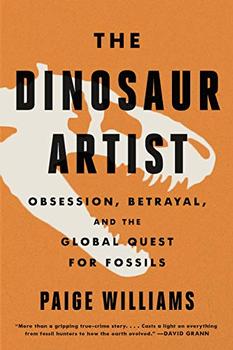Summary | Excerpt | Reviews | Beyond the Book | Readalikes | Genres & Themes | Author Bio

Obsession, Betrayal, and the Quest for Earth's Ultimate Trophy
by Paige Williams
"Our science" was an intriguing phrase. Murphy wasn't a trained scientist; he was an outdoorsman who had taught himself how to hunt fossils in the Cretaceous-bearing formations that run with photogenic accessibility through states like Wyoming, Utah, Montana, and South Dakota. He believed he had something to offer paleontology, and, presumably in pursuit of this idea, he had taken fossils that didn't belong to him. (Not Leonardo; another dinosaur.) What at first appeared to be little more than a bizarre true-crime story became, to me, an absorbing question of our ongoing relationship with natural history, with the remnants of a world long gone.
We know which life-forms exist because we encounter them, but what came before? Answers can be found in rock. If you've ever picked up a shark tooth or a leaf-imprinted stone, you were holding a fossil—a time portal, a clue. By definition, fossils are prehistoric organic remains preserved in the earth's crust by natural causes. If you, yourself, would like to become a fossil, a specific chain of events must occur. Your corpse must not be eaten or scattered by scavengers, or destroyed by other ruinous forces like weather and running water. You must be buried quickly in sediments or sand: metamorphic and igneous rock, which form under conditions too superheated and volatile to preserve much of anything, are no good at making fossils, but sedimentary rock—limestone, sandstone—proves an excellent tomb. Your soft tissues and organs will decompose, but unless they're obliterated by the planet's incessant chemical and tectonic motions, the hard bits—teeth and bone—will remain. These will be infiltrated by groundwater and will mineralize according to whatever elements exist in the patch of earth that has become your grave—eventually, you may become part crystal or iron. Then, to even start to be scientifically useful, you must be discovered.
Good luck with all that. It's been estimated that less than one percent of the animal species that ever lived became fossils.
While the process is rare, the product is ubiquitous, at least regarding some species. But which fossils are important to science and how should they be protected? Paleontologists have one answer, commercial fossil dealers another, and they've been fighting about it for generations.
As the only record of life on Earth, fossils hold the key to understanding the history of the planet and its potential future. Studying them, scientists can better monitor pressing issues such as mass extinction and climate change; hunting, collecting, or viewing them, anyone may feel connected to both the universe's infinite mystery and Earth's tangible past. To see the dinosaur bone beds of the Liaoning province of northeastern China is to see a landscape that 120 million years ago featured lush lakes and forests in the shadow of active volcanoes. To encounter Glossopteris imprints—an extinct seed fern found in South America, Africa, Australia, and Antarctica—is to witness evidence that those continents once existed as a single landmass. To hold a Kansas clam is to touch a relic of the Western Interior Seaway, which for roughly 20 million years bisected North America, overlaying what are now North Dakota, Wyoming, Colorado, Texas, Louisiana, Mississippi, and Florida, along with parts of fourteen other states and swaths of Canada and Mexico.
Fossils are found in every part of the world, and so are fossil collectors, who are legion. Collectors spend significant chunks of their lives hunting for fossils, researching fossils, buying fossils, displaying fossils, trading fossils, visiting fossils in museums, and talking—and talking and talking—about them. Fossil enthusiasts are as obsessed a segment of natural history lovers as ever existed. "I have been in people's houses where every possible inch of their home is covered in fossils," the vertebrate paleontologist Mark Norell, of the American Museum of Natural History, once said. "Even the dishwasher has trilobites in it."
Excerpted from The Dinosaur Artist by Paige Williams. Copyright © 2018 by Paige Williams. Excerpted by permission of Hachette Books. All rights reserved. No part of this excerpt may be reproduced or reprinted without permission in writing from the publisher.
Your guide toexceptional books
BookBrowse seeks out and recommends the best in contemporary fiction and nonfiction—books that not only engage and entertain but also deepen our understanding of ourselves and the world around us.